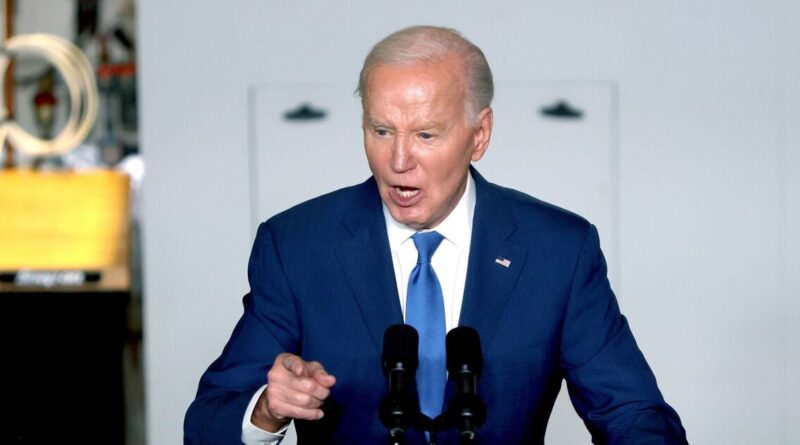Joe Biden says he ‘wont supply weapons’ to Israel if it attacks Rafah in staunch warning | US | News
United States President Joe Biden said he would not supply offensive weapons that Israel could use to launch an all-out offensive on Rafah.
Although the Gaza city is believed the to be last major Hamas stronghold, concern has been raised over the welfare of more than a million people sheltering in the area.
In an interview with CNN, Biden said the US was committed to Israel‘s defence and would supply Iron Dome rocket interceptors and other defensive equipment.
He added: “We’re not going to supply the weapons and artillery shells used.”
The US has historically provided large amounts of military aid to Israel.
And this has only accelerated in the aftermath of Hamas’ October 7 attack that say 1,200 people killed in Israel with another 250 thought to be taken hostage.
Bidens decision to pause shipment of heavy bombs to Israel shows the growing rift between the US and Benjamin Netanyahu’s government.
Biden said Wednesday that Israel‘s actions around Rafah had “not yet” crossed his red lines, but has repeated that Israel needs to do far more to protect the lives of civilians in Gaza.
The shipment was supposed to consist of 1,800 2,000-pound (900-kilogram) bombs and 1,700 500-pound (225-kilogram) bombs, according to a senior U.S. administration official who spoke on the condition of anonymity to discuss the sensitive matter.
The focus of US concern was the larger explosives and how they could be used in a dense urban area.
Biden explained: “Civilians have been killed in Gaza as a consequence of those bombs and other ways in which they go after population centers.
“I made it clear that if they go into Rafah – they haven’t gone in Rafah yet – if they go into Rafah, I’m not supplying the weapons that have been used historically to deal with Rafah, to deal with the cities, that deal with that problem.”
“We’re not walking away from Israel‘s security. We’re walking away from Israel‘s ability to wage war in those areas.”
Defense Secretary Lloyd Austin earlier Wednesday confirmed the weapons delay, telling the Senate Appropriations Subcommittee on Defense that the U.S. paused “one shipment of high payload munitions.”
It also comes as the Biden administration is due to deliver a first-of-its-kind formal verdict this week on whether the airstrikes on Gaza and restrictions on delivery of aid have violated international and US laws designed to spare civilians from the worst horrors of war.
A decision against Israel would further add to pressure on Biden to curb the flow of weapons and money to Israel‘s military.
Biden signed off on the pause in an order conveyed last week to the Pentagon, according to US officials who were not authorized to comment on the matter.
Biden’s administration in April began reviewing future transfers of military assistance as Netanyahu’s government appeared to move closer toward an invasion of Rafah, despite months of opposition from the White House.
The official said the decision to pause the shipment was made last week and no final decision had been made yet on whether to proceed with the shipment at a later date.
US officials had declined for days to comment on the halted transfer, word of which came as Biden on Tuesday described U.S. support for Israel as “ironclad, even when we disagree.”
Israel‘s ambassador to the United Nations, Gilad Erdan, in an interview with Israeli Channel 12 TV news, said the decision to pause the shipment was “a very disappointing decision, even frustrating.”
Meanwhile Biden has faced pressure from some on the left – and condemnation from the critics on the right who say Biden has moderated his support for an essential Mideast ally.
Israeli troops on Tuesday seized control of Gaza’s vital Rafah border crossing in what the White House described as a limited operation that stopped short of the full-on Israeli invasion of the city that Biden has repeatedly warned against, most recently in a Monday call with Netanyahu.
Israel has ordered the evacuation of 100,000 Palestinians from the city. Israeli forces have also carried out what it describes as “targeted strikes” on the eastern part of Rafah and captured the Rafah crossing, a critical conduit for the flow of humanitarian aid along the Gaza-Egypt border.
Privately, concern has mounted inside the White House about what’s unfolding in Rafah, but publicly administration officials have stressed that they did not think the operations had defied Biden’s warnings against a widescale operation in the city.
The State Department is separately considering whether to approve the continued transfer of Joint Direct Attack Munition kits, which place precision guidance systems onto bombs, to Israel, but the review didn’t pertain to imminent shipments.
Itamar Yaar, former deputy head of Israel‘s National Security Council said the U.S. move is largely symbolic, but a sign of trouble and could become more of a problem if it is sustained.
“It’s not some kind of American embargo on American munitions support, but I think its some kind of diplomatic message to Mr. Netanyahu that he needs to take into consideration American interests more than he has over the last few months,” he said. “At least for now it will not impact Israeli capability but it’s some kind of a signal, a ‘be careful.'”
The U.S. dropped the 2,000-pound bomb sparingly in its long war against the Islamic State militant group. Israel, by contrast, has used the bomb frequently in the seven-month Gaza war. Experts say the use of the weapon, in part, has helped drive the enormous Palestinian casualty count that the Hamas-run health ministry puts at more than 34,000 dead, though it doesn’t distinguish between militants and civilians.
The U.S.-Israel relationship has been close through both Democratic and Republican administrations. But there have been other moments of deep tension since Israel‘s founding in which U.S. leaders have threatened to hold up aid in an attempt to sway Israeli leadership.
President Dwight Eisenhower pressured Israel with the threat of sanctions into withdrawing from the Sinai in 1957 amid the Suez Crisis. Ronald Reagan delayed the delivery of F16 fighter jets to Israel at a time of escalating violence in the Middle East. President George H.W. Bush held up $10 billion in loan guarantees to force the cessation of Israeli settlement activity in the occupied territories.





